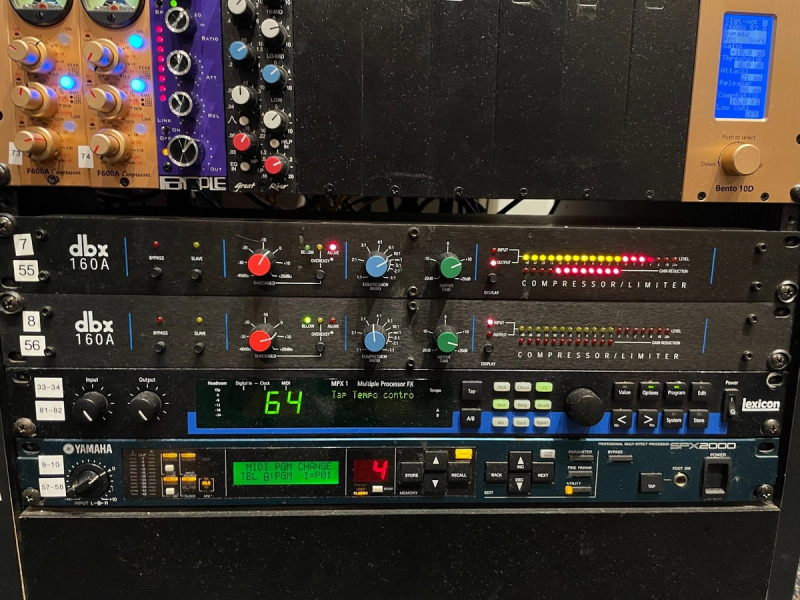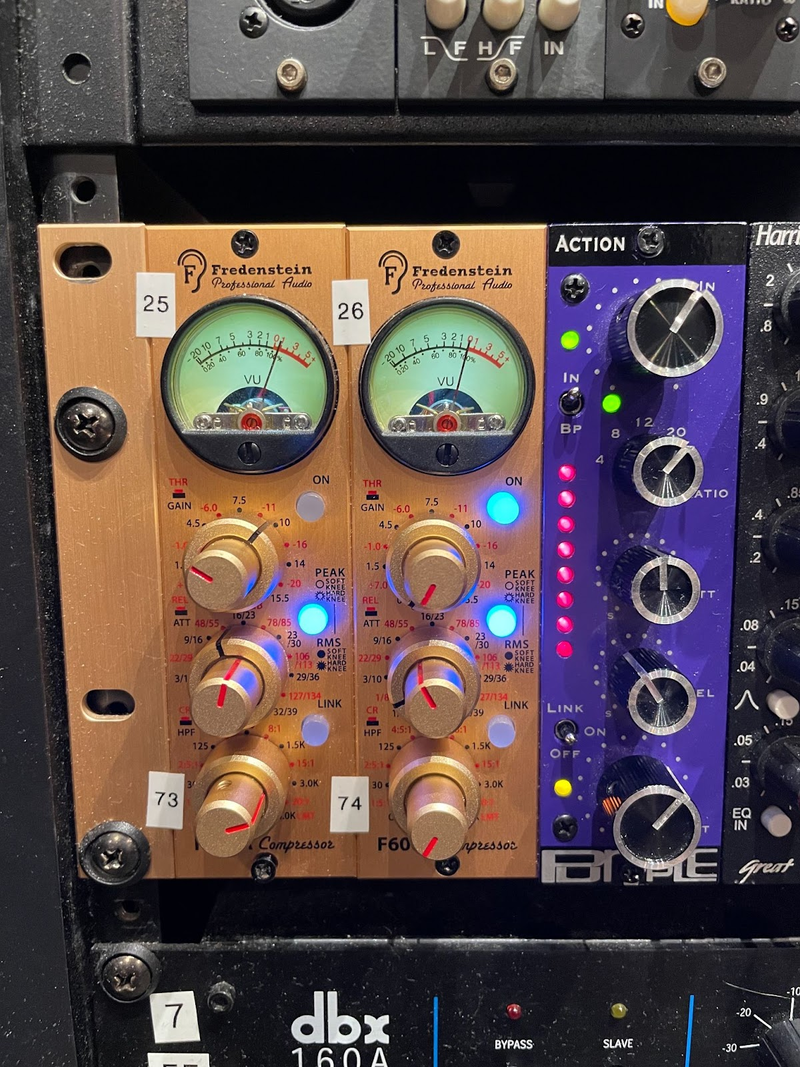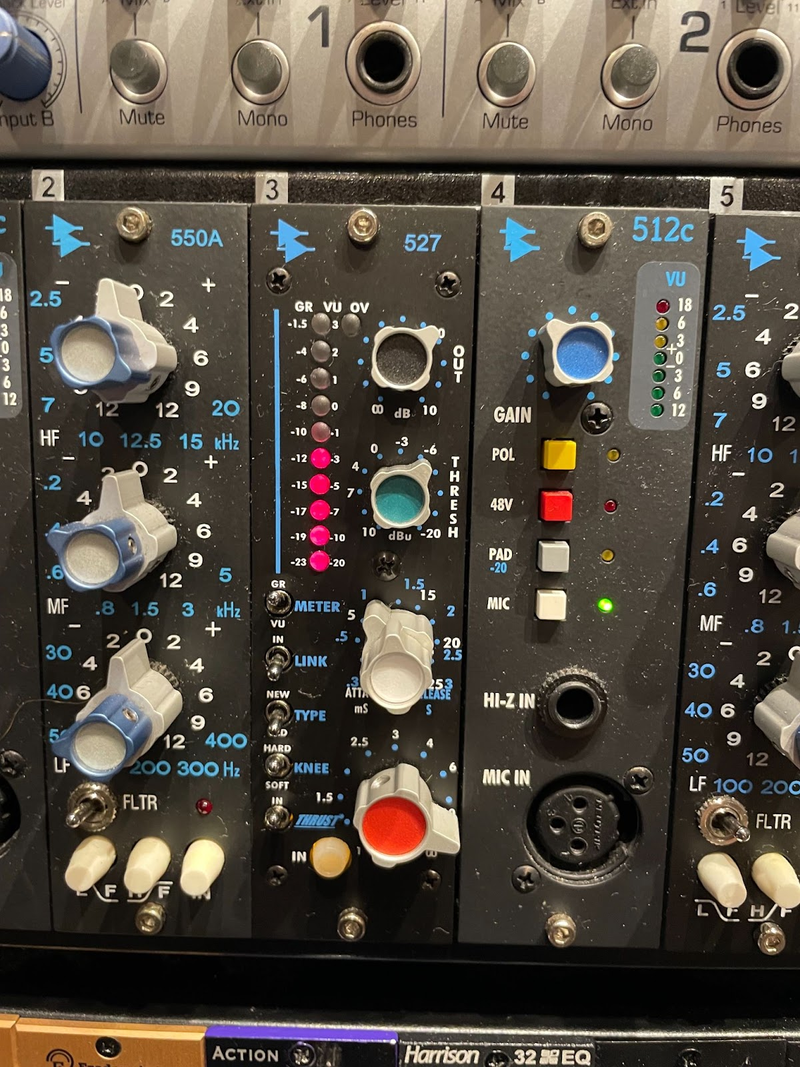
METAL MAYHEM: The ULTIMATE Heavy Metal Bass Compressor Battle
Dive deep as we shoot out 4 different hardware compressors.
Choosing the right compressor for bass guitar can be tricky, especially trying to find the balance between up being up front and clear, and having its perfect balance in the mix. Today I set out to look into the many different compressors and their role for a bass in a song. I had the pleasure of working with Noah Pack, who is a part of Big Iron, a local metal band in Columbus, OH. We recorded a 8 bar phrase to have 4 different compressors to have looked at in the spotlight.

Before we started recording, I wanted to research the fundamentals of recording a bass amp. I found that many engineers don’t bother recording a bass amp, and just record with a DI. An article from Reverb suggested using a Sennheiser MD 421-II, a little off axis and 1 to 2 inches from the cone. Noah had contacted me previously and told me he wanted to try out a Audix D6 mic on the bass, so I decided to look into that. This video review from Novro Studios shows a shootout between an AKG D112 and an Audix D6 mic. The D6 had a great low-end response and a lot of attack. I wasn’t sure which one we should go with, so I miked both of them up on Noah’s bass cab and compared them both before going through with the compressor tests. Both mics were recorded with an API 512c preamp into Pro Tools. We ended up liking the 421 better for his particular tone, but I definitely will keep the D6 in mind! It blew me away!


Now, onto the fun stuff… There’s a ton of cool compressors in Capital University’s Studio A, so it was hard to pick between some of them! I ended up going with the dbx 160A, Fredenstein’s F600A, an API 527, and a Purple Audio Action FET compressor. The dbx 160A is renowned for its use in drums and bass, so I was excited to see how it was going to hold up. The F600A was an interesting unit to work with, as it doesn’t use analog hardware to process the audio, rather, it uses a DSP engine inside to do the compression and sidechaining in real time. The API 527 is a very interesting compressor, including new (feed-forward) compression and old (feed-back) compression. Newer compressors are typically feed-forward, so I wanted to try out the feed-back option to see how it sounds. If you don’t know what I’m talking about, take a look into feed-forward and feed-back compression. The 527 also included a “THRUST” option, which actually imposes a high-pass filter onto the sidechain, leaving a meaty bass response with a defined top end. The last piece of gear is the Purple Audio Action FET-style compressor. This compressor is reminiscent of the MC77, an 1176-style compressor also made by Purple Audio, it’s just that the Action is made in a 500 series rack form, something I didn’t know!


During my testing, I wanted to keep the compression settings similar, just to see how the compressors added their own flavor to the audio. I did a 10:1 ratio when applicable, with -10 dB of gain reduction, medium attack and a medium to fast release. After the tedious hour of gain-matching and testing, the results were interesting! I could definitely tell the 1176 style compression the Purple Action uses, but definitely has more oomph. The 527 blew me away, for this particular bass tone, it sounded amazing. Just the right amount of compression and attack and the low end energy made this stand out. It really glued everything together. I wasn’t super happy with the Fredenstein, as I think that compressor has some better applications, like vocals, or as an overall 2 channel sum bus compressor. It was awfully too clean and gentle for this application, heavy metal bass. The dbx 160A sounded very similar to the 527 in my opinion, but I don’t think I drove the input hard enough for this compressor to really shine. In a later test, and with different source material, I’d like to go back and re-test the 160A against the 527.
Obviously don’t take my word for it, I’m just some random guy on the internet. Listen to these yourself and make your own conclusions:
Overall, I’m crowning the victor to the API 527, dbx 160A in 2nd, Purple Action in 3rd, and the Fredenstein in 4th. I think all of these compressors (maybe with exception with the Fredenstein) will do a bang up job on a heavy metal track like this, so you really can’t go wrong with anything. I will definitely be utilizing the API 527 more, and trying to find other applications for these other compressors.
